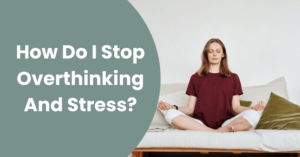As women, our hormonal balance is constantly under the influence of internal and external factors. Because of this, you might be wondering if your hormones are in balance – and if not, then how do I treat my hormonal imbalance?
I personally know how much life circumstances and stress can affect your physical health and wellbeing and I’ve been walking this path myself. Therefore, it’s an honor to share my personal and professional perspective with you as a hormonal therapist on how to fix your hormonal imbalance.
In order to know if your hormones are imbalanced, you, first of all, have to get a feeling of your symptoms and noticeable changes both physically and mentally. Because the mind and body are one, these signs are usually connected on a deeper level.
Second of all, getting tested is crucial to find the root cause of your symptoms. It’s possible to get an in-depth test through your hormonal therapist, and together you’ll make the best recovery plan for you to get your hormones and health in balance.
In order to figure out if your hormones are imbalanced, let’s go in-depth with the subject, hormones.
What Are Hormones?
Hormones are released through the endocrine system by glands, organs, and tissue. Our hormones are the chemical messengers in the body that travels through the bloodstream and tells your body what to do. It’s an essential part of our state of wellbeing and feeling balanced.
Scientists have discovered more than 100 different hormones and are part of processes like:
- Metabolism
- Mood regulation
- Reproduction
- Internal balance (homeostasis) like blood pressure, blood sugar regulation, water and electrolyte balance, and temperature
- Circadian rhythm
- Sexual function
The glands that release the hormones are:
- Hypothalamus
- Pituitary gland
- Thyroid
- Parathyroid glands
- Pineal gland
- Pancreas
- Adrenal glands
- Ovaries
- Testes
But not only from the glands, but also from tissues and organs such as fat tissue, kidneys, liver, gut, and placenta.
Are My Hormones Imbalanced?
As listed above, we have plenty of hormones to take care of as well as glands and organs – and it might seem like a big puzzle of how it’s all connected.
Oftentimes when we are dealing with gut issues, a sluggish liver, thyroid issues and weight gain, stress, acne, PMS, female infertility and mood changes, anxiety and brain fog it’s often a warning sign from our body that we’re out of homeostasis (balance). You might as well wonder, what specific signs and symptoms you have to be aware of as a female, which I’ll answer in the following.
What Are The Signs And Symptoms Of Hormonal Imbalance
Some of the most common symptoms and signs of hormonal imbalance to look out for and some of them I’ve experienced myself when going through hormonal imbalance include:
- Fatigue
- Constipation, diarrhea or IBS
- Depression
- Anxiety
- Chronic stress
- Unexplained weight gain or weight loss
- Acne
- Mood swings and irritation
- Insomnia and difficulties in sleep
- Higher cholesterol levels
- Irregular menstrual cycle
- Lack of menstruation
- Heavy bleeding from menstruation and pain
- Infertility
- Low sex drive or vaginal dryness
- Insulin resistance and blood sugar issues
- Getting sick often
- Lack of energy
- Unable to rest and relax properly
- Difficulties maintaining muscle mass
- Irregular distribution of fat
- Dry, coarse skin and hair
Remember to be aware that not all of these symptoms are direct indicators of an imbalance, but commonly more than one symptom is present. Oftentimes stress, lifestyle, and diseases are big factors what cause hormonal imbalances, which I’ll give you an indicator of next.
What Causes Hormonal Imbalance?
When looking at hormonal imbalance, finding the root cause is an essential part of the process – and often lifestyle factors are a part of the problem to begin with. Hormonal imbalances are likely to happen throughout our whole lives but as women especially, through puberty, pregnancy, menopause as well as when we are chronically sick.
Personally, I believe hormones are a physical manifestation of emotions and there’s a deeper connection between hormonal imbalance and dealing with stress, anxiety, depression, and trauma.
How Does Stress Affect Hormonal Imbalance?
The hormones related to stress are called cortisol, adrenaline and noradrenaline.
Stress is naturally a part of our lives but daily stressors are not the main issue in this context. When stress becomes chronic, that’s when it starts to affect our overall health.
Chronic stress comes in different forms and for different reasons such as trauma, PTSD, low body-intuition-connection and respecting your body’s cues on when to rest and digest. Work-life balance, life circumstances, like pregnancy, loss of a loved one or financial issues, nutrition and lifestyle are also huge factors and therefore stress is not defined by one thing alone.
Chronic stress affects our nervous system dysregulation which means we produce higher amounts of adrenaline and noradrenaline (also known as norepinephrine), activating our sympathetic nervous system. When indulging in coffeé and sugar, which spike even more adrenaline and stress, they will naturally deplete our minerals, increase anxiety and affect our sleep cycle.
The lack of minerals will also affect our energy production in our cells negatively, making us feel tired, and wired yet still jacked on adrenaline. This is a vicious cycle that’ll continue until the adrenal glands get exhausted causing adrenal fatigue.
Finding the root cause of chronic stress is a big factor in balancing our cortisol, adrenaline and noradrenaline hormone production. Finding the root of the issue will help you manage your hormones better and to know what kind of changes are necessary looking forward.
How Does Anxiety Affect Hormonal Imbalance?
Talking about mental health and diseases is obviously a sensitive subject, but nonetheless important when talking about hormones.
Anxiety is affected by our hormones and as a female, it often includes estrogen, progesterone, cortisol, adrenaline and oxytocin.
Estrogen and progesterone levels often drop in the luteal phase (last phase) of our menstrual cycle. Lower levels of estrogen and progesterone might increase anxiety and fear, but higher levels of estrogen help increase serotonin, our happiness hormone, which has a calming effect on our nervous system and anxiety.
Our stress hormones cortisol and adrenaline as I talked about earlier cause an effect on anxiety as well. Higher levels of adrenaline tend to make us more jittery, nervous and unable to relax.
When feeling stressed and lacking love for ourselves or from others, we’ll experience a decreased amount of oxytocin which is our love hormone. Oxytocin is a nerve-stimulating hormone released by physical touch, hugging, cuddling, sex and breastfeeding. It gives us a sense of wellbeing and is a stress and anxiety reliever.
How Does Depression Affect Hormonal Imbalance?
When talking about depression it isn’t a simple condition only affected by hormones. It’s also a chemical imbalance affecting our brains as well. When neurotransmitters in the brain such as serotonin, dopamine and norepinephrine are unbalanced, it affects our feeling of happiness and pleasure.
Serotonin and dopamine are important neurotransmitters (also called our messengers) regulating several functions in our body.
Serotonin which is primarily made in the gut is our happy hormone. When our gut is a mess and we’re experiencing gut issues, or in general an inability to convert serotonin correctly, our brain chemistry will naturally be affected as well.
Not only does serotonin regulate our emotional state of being, but also processes like:
- Circadian rhythm (sleep cycle)
- Metabolism
- Appetite (cravings or lack of appetite)
- Movement in the digestion tract (constipation or diarrhea)
- Cognitive function
- Ability to concentrate
- Hormonal activity
The neurotransmitter dopamine carries signals between neurons in the brain. It’s involved in coordination, pleasure, motivation, cravings, satisfaction and reward system. When our dopamine levels are low it affects our ability to create adrenalin and noradrenalin.
Dopamine is also a part of processes in the body like:
- Mood
- Sleep
- Learning
- Concentration
- Motivation
When having low levels of dopamine we’re often experiencing more cravings and it’s possible we’ll indulge different kinds of substances. There will be a tendency to get addicted to work, alcohol, gambling, drugs, exercise, etc. which releases a dopamine kick or feeling of euphoria and motivation which for some people will create an addiction.
Therefore low levels of dopamine will unconsciously control our behavior, patterns, and feeling of satisfaction in life.
How Does Pregnancy Affect Hormonal Imbalance?
During pregnancy, estrogen and progesterone play a major role in hormonal changes.
When you become pregnant and you’re in the first trimester, estrogen and progesterone rise dramatically and you start producing the pregnancy hormone gonadotropin (also called hCG). hCG is measured in the urine and high levels are an indicator of forming the placenta and some experts state that it’s also why certain people feel the morning sickness.
Progesterone helps the egg to implant and prevents the uterus from contracting until labor occurs – and it’s often associated with mood swings because it’s chronically elevated. Estrogen helps regulate progesterone but also increases blood flow which transfers nutrients to the fetus.
In the second trimester, as the fetus is growing, it’ll be normal to experience pain in ligaments, joints and pelvis as everything is expanding. Estrogen and progesterone continue to increase as well as cortisol which develops and regulates metabolism and blood sugar levels.
In the third trimester, estrogen and progesterone peak and the body starts developing the hormones needed for postpartum. Prolactin, which is hormone-stimulating breast tissue, rises to the highest level when preparing to produce milk – even though we don’t produce it until after childbirth and there’s a drop in estrogen and progesterone.
After birth, endorphins help manage the pain and give us a rush of happiness. After a couple of days when releasing the placenta, the hormones like estrogen, progesterone, etc. drop heavily. That’ll make us start feeling the post-baby sadness as well as feeling a bit stressed from being a mother.
Even though it’s possible to feel post-baby sadness, or for some women even depression, we release oxytocin and prolactin which make us feel love and connection.
With time hormones will slowly balance out when getting back into the menstrual cycle and supporting our hormones naturally, but it’ll take some time until everything is normalized.
How Does Menopause Affect Hormonal Imbalance?
When entering menopause, women experience a hormonal imbalance. The ovaries no longer respond to the hormonal messages sent from the pituitary gland which leads to the end of ovulation.
During menopause hormones like estrogen and progesterone drop which give symptoms like:
- Hot flashes
- Night sweats
- Mood changes
- Insomnia
- Low sex drive
- Vaginal dryness
- Anxiety like irritability, restlessness, difficulty concentrating, racing heart and excessive worrying
Another hormone that drops as well is testosterone which for women decreases slowly between age 20-40 causing low libido, changes in cognitive function, mood and increasing risk of osteoporosis and hormonal acne.
When entering menopause, supporting our hormones naturally will ease our symptoms.
How Do Birth Control Pills Affect Hormonal Imbalance?
Birth control pills not only affect our hormones but also have multiple side effects.
The hormones in the pill suppress the production of progesterone and estrogen through a negative feedback mechanism causing our natural hormones to turn off which prevent ovulation. This can lead to an imbalance and estrogen dominance.
How Does Trauma Affect Hormonal Imbalance?
Trauma, emotional stress and PTSD, especially earlier in childhood are often stored in our nervous system. When we go through hard times or experience traumatic events, it triggers our nervous system to physiologically adapt to the environment. Oftentimes it’s not about the event itself but how we store the trauma, how our body remembers and chooses to regulate it in the future.
Trauma affects our HPA axis, which is our stress response system, which is a link between our nervous system and endocrine system (which controls hormones). When trauma affects the HPA axis it’ll increase adrenaline and cortisol and decrease oxytocin. When having trauma the stress response is constantly kicking in and out and long-term trauma will make sure to continue producing stress hormones which have a negative impact in the long run.
Working on releasing stored trauma, balancing our nervous system regulation and stress management are important parts of healing hormonal imbalance.
How Do Eating Disorders Affect Hormonal Imbalance?
Eating disorders like anorexia nervosa, bulimia nervosa and binge-eating disorder significantly affect physical and psychological health.
When being underweight as a result of extreme dieting and lack of nutrients it’ll affect our hormones influencing growth hormones, bones, puberty, fertility, metabolism, blood sugar regulation, appetite and stress hormones.
When affecting the stress hormones for a longer period, it can lead to sleep problems, anxiety and depression. When being underweight and the body is in survival mode, it affects the production of gonadotropin and luteinizing hormone resulting in low estrogen and progesterone which leads to irregular or amenorrhea.
Being undernourished affects overall health and especially our HPA axis, stress hormones and nervous system by constantly being alert and in survival mode. Causing the body to use less energy on processes like fertility and growth in order to survive.
How Do Hypothyroidism And Hyperthyroidism Affect Hormonal Imbalance?
The thyroid gland is located in front of your neck with the main purpose of controlling your metabolism. When talking metabolism, it’s basically how the body transforms food into energy. The thyroid creates hormones called T3, T4 and calcitonin. The amount of thyroid hormones in the blood is controlled by the pituitary gland in the brain which monitors levels of thyroid-stimulating hormones (called TSH).
When the thyroid produces too little or not enough hormones, it affects multiple processes in the body. These conditions are known as hypothyroidism and hyperthyroidism respectively.
Hypothyroidism is when you’re not producing enough of the hormones discussed above which causes an imbalance and therefore, your metabolism slows down. This is caused by either because of a condition that impacts the thyroid (responsible for T3, T4 and calcitonin production) or something that affects the pituitary gland (responsible for TSH production).
The common symptoms include:
- Fatigue
- Weight gain
- Constipation
- Dry skin and hair
- Frequent periods
- Depression
- Numbness in hands
- Brain fog
When dealing with hyperthyroidism it’s the other way around. The thyroid produces too much thyroid hormone also causing an imbalance.
The most common symptoms are:
- Weight loss
- Sweating
- Changes in the menstrual cycle
- Fast heart rhythm
- Increased hunger
- Sleeping problems
- Fatigue
- More frequent bowel movements
- Anxiety and irritability
Usually, both conditions can be tested by a doctor using something called a TSH test.
Other Conditions That Affect Hormonal Imbalance
It’s not only the above-mentioned conditions that most likely cause hormonal imbalance. It’s also conditions like:
- Cancer
- Cancer treatment
- Unhealthy diet
- High percentage of body fat
- Pituitary tumors
- Diabetes
- Toxins, pollution and pesticides
- Estrogen dominance
- Hormonal replacement medication
- Certain medication
As mentioned earlier, in order to figure out if your hormones are imbalanced, finding the root cause is necessary. This will always involve testing, which we will touch on next.
How Do I Test My Hormones As A Female?
In order to test if your hormones are imbalanced as a female there are different methods to follow as it’s not a simple procedure to diagnose.
How Do I Test My Hormones At The Doctor?
When getting an appointment at the doctor’s office, write down your symptoms and be prepared to answer a series of questions about your mental and physical health.
Our bodies are packed with hundreds of hormones, which is why it’s important to make a precise description of symptoms so the health care provider can know what’s important to measure. When talking about hormonal imbalance, often we’re talking about steroid hormones such as estradiol, estriol, progesterone, testosterone, DHEA and cortisol. These types of hormones are lipophilic which means it’s difficult to measure precisely in a blood sample.
Hormones that are more precise and measurable in a blood sample are when having hypothyroidism or hyperthyroidism. If you suspect that’s the case, it’s important to measure:
- FT3 (free T3)
- FT4 (free T4)
- RT3 (Reverse T3)
- TSH (Thyroid-Stimulating-Hormone)
- Ferritin
- Cholesterol (HDL, LDL and total)
- Anti-TPO (Anti Thyroid-Per-Oxidase)
- TgAb (Thyro-globulin Anti-body)
- Blood pressure
To measure our important steroid hormones, I’ll explain to you which test I’ll recommend as a hormone therapist.
How Do I Test My Hormones?
In order to measure steroid hormones I’ll recommend consulting a hormone specialist to do a DUTCH test. DUTCH means “Dried Urine Test Comprehensive Hormones”.
In order to see if you are eligible for a DUTCH test you can click here to fill out the contact form for a free 30-minute consultation.
The hormones measured include:
- Estrone
- Estradiol
- Estriol
- Progesterone
- Testosterone
- DHEA
- Melatonin
- Cortisol
- Cortisone
The test is different from a blood test in that, it also monitors cortisol and cortisone rhythms, plus estrogen metabolism pathway. A blood test is not sensitive enough to measure the differences in estrogen levels which is important when testing women’s hormone levels. This makes the DUTCH test the preferred testing method when dealing with hormonal imbalances.
Another test that’s also measuring steroid hormones is the saliva test. The saliva test is also a safe and accurate option for testing your hormones – it relates to specific symptoms of either excess or deficiency.
In order to get more information about how to test hormonal imbalance click here.
How Do I Treat My Hormonal Imbalance?
Now that you’ve got more insight into why your hormones might be imbalanced you might be wondering ‘How do I treat my hormonal imbalance?’
The bad news is – there’s no ‘one size fits all’ to just go get a medical supplement and then you’ll feel better in a month.
The good news is – through testing and finding your root cause I can help and guide you to naturally bring your balance back.
What Can I Eat To Balance My Hormones?
Changing your nutrition and lifestyle will be a big factor in healing your hormones. Some of the most important steps would be:
- Stabilize your blood sugar by eating every 3-4 hours.
- Prioritize whole foods plus protein, fat and complex carbs in every meal.
- Limit/cut out caffeine and never drink it on an empty stomach.
- Avoid refined sugar and inflammatory food.
- Manage stress through meditation, nature, and doing joyful things.
- Get light first thing in the morning to set your circadian rhythm.
- Prioritize strength training when talking about exercise.
What Supplements Improve Hormonal Imbalance?
Which kind of supplements and vitamins you’ll need depend on your individual test result.
The most common one are:
- B vitamin
- Multivitamin
- Magnesium
- Omega 3 (fish oil)
- CoEnzyme Q10
- Probiotics for gut health
- Ashwagandha
- Vitamin D
- MACA
- N-Acetyl-Cystein
If you want to know more about how supplements affect your hormonal imbalance click here to get a description of them.






